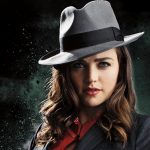How I came to write At the Table of Wolves
- Jul 24, 2017
- 3 min read
For a little background on how I came to write my latest novel, At the Table of Wolves, here are some frequently asked questions.
Why did you chose to set this historical fantasy in the 1930s?
The 1930s – and particularly in England – was a period overshadowed by the catastrophic losses of World War I. Every family had its losses, and the public attitude was to willfully turn a blind eye to Hitler’s arms build up. So instead of a war with steal, it became a shadow war of spies, secrets, and deception. It is such a fertile ground for fiction! The roster of characters and motivation is vast: British aristocracy fearing the loss of class privilege, fascists, pacifists, spies and those who chose to do nothing. This historical context raises an interesting question: What would you have done? How much would you have sacrificed to stop the coming war?
What inspired you to write this historical fantasy?
The first inspiration came from William Manchester’s biography of Winston Churchill. I’m especially interested in the World Wars (and their lead-ups)–times with amazing contrasts between self-sacrificing idealism and staggering villainy. I had previously dealt with the historical period of the 1850s in England and India for my fantasy A Thousand Perfect Things, and was looking for a different, largely unexplored, time period for my next fantasy.
What are the fantasy elements for this realistic setting?
Psi-powers are a relatively new phenomenon, but came into the world as a result of the society-wide psychological suffering of World War I. Called Talents, these powers affect perhaps one in a thousand individuals. Because psi-powers are not widespread, they engender suspicion and fear among many. My premise is that the Germans have been weaponizing Talents and are years ahead of England and the US. I wanted to explore how occult powers would change society and also open doors for women who had Talents. Some of the powers revealed in Wolves (more to come in the sequel) are: the spill, trauma view, conceptor, mesmerizing, disguise, attraction, hypercognition, precognition, darkening and hyperempathy.
How accurate is the espionage context and the examples you show of trade craft?

As accurate as I could make them after intensive research. The Secret Intelligence Service (SIS) is shown with as much actual detail as I could manage, including its political context. The chief of SIS was known as “C,” and in my story, “E.” Monkton Hall, where Talent research is carried out, was inspired by Bletchley Park. The trade craft was especially fun to research, with things like dead drops, brush passes, code names, surveillance, moles and so much more adding to the flavor of the shadow world that was (and is) espionage.
Publisher’s Weekly (Starred review) pointed to the moral ambiguities brought forward by the story. What were the main ones?
Espionage, like war, is full of horrific choices, but often they are decisions one has to make alone in the field.
What is justified in terms of harm and betrayal of the innocent?
How many lies can you tell without losing your sense of truth?
What if you start enjoying deception for it’s own sake?
How can Kim Tavistock come to terms with her Talent for “hearing the truth”? How can you use your Talent in a larger cause, when it means exploiting confidences and people’s weaknesses?
Does the evil of fascism that you depict in your story
present a threat today?
We tend to think of the Nazi brutality and ideology as an aberration. We’d like to think it could never happen again. But then, how did the holocaust ever happen? Does human nature change? Looking at North Korea, we can see that the world is still capable of ideological evil, when a leader can starve his people and, yes, establish concentration camps. I believe we are forewarned by the catastrophe of Nazism. We should be aware of, and watchful for the way that people allowed it creep up on them. Most of us will never be called upon to be heroes in such a fight. But to combat a great evil, we have to stand against it close to home wherever it begins to tinge our thinking through religious intolerance and racism. We can all do that, and must.
Is this a series?
They are linked novels under the title “The Dark Talents novels.” The sequel, Serpent in the Heather, comes out in April, 2018, and continues the espionage adventures of Kim Tavistock, spy extraordinaire!
What formats will it be in?
So far: Hardcover, e-book and audio version. The latter will come out on August 15, 2017.
What books do you recommend for people interested in espionage novels and nonfiction?
There are so many, but here are a few top ones.
Nonfiction:
A Spy Among Friends. Ben McIntyre
The Secret History of MI6. Keith Jeffery
“C” The Secret Life of Sir Stewart Menzies, Spymaster to Winston Churchill. Anthony Cave Brown
Double Cross. Ben McIntyre
Fiction:
The Night Soldier books. Alan Furst
The Spies of Warsaw. Alan Furst
Any book by John le Carre.
Istanbul Passage. Joseph Kanon.




Comments